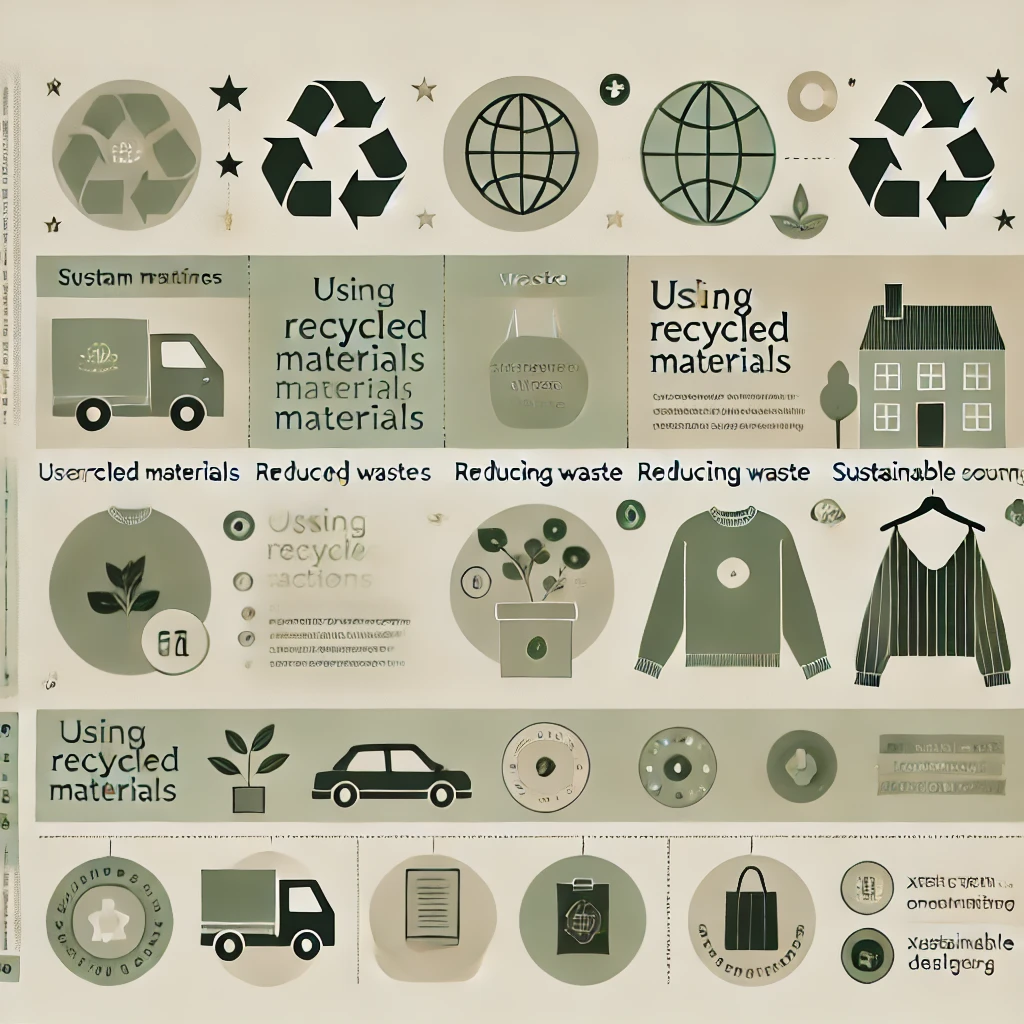In today’s fast-paced world, environmental responsibility has become an essential part of business operations across all sectors. However, few industries are as under the spotlight for environmental impact as fashion. Known for its rapid turnover and resource demands, fashion has both the opportunity and the obligation to lead a movement toward sustainability.
Table of Contents
🌱 The Fashion Industry’s Environmental Impact
The fashion industry is responsible for a large portion of global pollution, with textile production contributing to greenhouse gases, water waste, and chemical pollution. Let’s take a closer look at the impact:
- Water Consumption: Producing a single pair of jeans requires up to 10,000 liters of water! The industry uses more water than any other sector except agriculture.
- Carbon Emissions: The fashion sector contributes around 10% of the world’s carbon emissions, which is more than all international flights and maritime shipping combined.
- Waste and Pollution: Fast fashion leads to immense waste. Each year, millions of tons of textiles end up in landfills, while harmful dyes and chemicals pollute water sources.
💚 What is Environmental Responsibility in Fashion?
Environmental responsibility in fashion means making conscious choices in sourcing, production, and distribution to reduce environmental harm. It involves rethinking traditional methods, opting for sustainable materials, and reducing the industry’s carbon footprint.
Key Principles of Environmental Responsibility in Fashion:
- Sustainable Sourcing: Using renewable, organic, and ethically sourced materials such as organic cotton, bamboo, or recycled polyester.
- Waste Reduction: Implementing recycling programs, producing to order, or repurposing materials to minimize waste.
- Fair Labor: Ensuring safe, fair, and healthy working conditions for all employees in the supply chain.
- Low Impact Production: Adopting eco-friendly dyes and manufacturing processes that limit water and chemical usage.

🧶 How Brands are Embracing Environmental Responsibility
Several forward-thinking fashion brands are now leading the way in environmental responsibility:
- Patagonia: Known for its commitment to environmental responsibility, Patagonia uses recycled materials and offers repair services to extend the life of its products. Their “Worn Wear” program encourages consumers to trade in or repair rather than replace items.
- Stella McCartney: An industry leader in sustainable luxury, Stella McCartney’s brand avoids animal leather, fur, and PVC. The company is also committed to circular fashion through recycled materials.
- Levi’s: By adopting the “Water<Less” initiative, Levi’s has reduced water use by up to 96% in denim finishing. The brand also promotes recycling and has a sustainability-focused line.
📈 Environmental Responsibility Beyond Fashion
Environmental responsibility isn’t limited to fashion; businesses across sectors are adopting eco-friendly practices. Here’s how companies outside fashion are taking steps:
- Technology: Tech companies are minimizing energy use and e-waste. For example, Apple recycles old devices and has committed to using recycled aluminum in its products.
- Food and Beverage: Starbucks and other chains have eliminated plastic straws and offer reusable cup programs to reduce single-use plastics.
- Automotive: The shift to electric vehicles (EVs) by brands like Tesla, Nissan, and Ford showcases how environmental responsibility is taking hold in traditional industries.
🌍 Why Environmental Responsibility Matters
Taking action toward environmental sustainability is not just good PR; it’s essential for the planet and its people. Here are some reasons why environmental responsibility is important:
- Climate Change Mitigation: Reducing emissions and resource use is vital to limit global warming.
- Biodiversity Conservation: Sustainable practices prevent the destruction of ecosystems.
- Health Benefits: Reducing pollution improves public health by providing cleaner air, water, and safer products.
- Consumer Demand: With consumers becoming more eco-conscious, brands that adopt sustainable practices can build loyalty and trust.
| Aspect | Details | Example |
|---|---|---|
| Impact | High water use, pollution | 10% of global emissions |
| Sustainable Actions | Recycled materials, low-impact dyes | Patagonia, Levi’s |
| Beyond Fashion | Tech, Food, Automotive sectors | Apple, Starbucks, Tesla |
| Consumer Tips | Buy quality, recycle, shop eco | Thrift stores, eco-brands |
| Why it Matters | Reduces pollution, conserves resources | Improved health, eco-growth |
🌐 What Consumers Can Do to Support Eco-Friendly Fashion
- Choose Quality Over Quantity: Invest in high-quality pieces that last rather than fast fashion items that wear out quickly.
- Shop Secondhand: Thrift stores and online marketplaces like ThredUp or Depop help reduce waste by giving clothing a second life.
- Look for Sustainable Brands: Support brands that prioritize the environment. Many companies offer eco-friendly alternatives without compromising style.
- Care for Clothes Properly: Extend the life of your clothes by washing them less often, using cold water, and air-drying.
- Participate in Recycling Programs: Many brands and local organizations accept old clothes for recycling or upcycling.

💬 Quote of Inspiration
“We don’t need a handful of people doing zero waste perfectly. We need millions of people doing it imperfectly.” – Anne-Marie Bonneau
Conclusion: Paving the Way Forward
Environmental responsibility in fashion and business is not a trend; it’s a necessity. As businesses adopt sustainable practices and consumers embrace eco-friendly choices, we move closer to a future where industry growth aligns with the health of our planet.
By supporting responsible brands, choosing sustainable practices, and staying informed, we can help shape an environmentally conscious future. Let’s make every choice count!
Stay healthy, inspired, and informed with Xiel.online! 🌱






